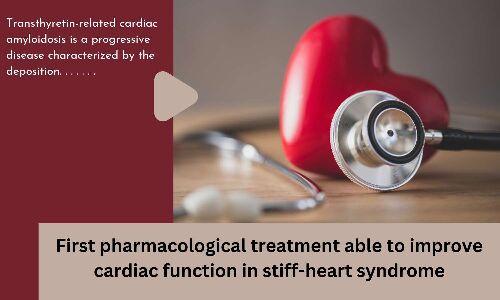First pharmacological treatment able to improve cardiac function in stiff-heart syndrome

Transthyretin-related cardiac amyloidosis is a progressive disease characterized by the deposition of amyloid protein fibrils in the heart. Amyloid fibril deposition thickens and stiffens the heart walls, and the disease is also known as stiff-heart syndrome. The accumulation of amyloid fibrils causes heart failure, and patients suffer from fluid retention, fatigue, and arrhythmias. The disease can be caused by genetic mutations or related to aging. Prognosis is poor, and untreated patients survive for an average of just 3 years.
Now, the results of a study published in the The New England Journal of Medicine (NEJM) promise to radically alter the prospects of patients with Transthyretin-related cardiac amyloidosis. The study represents a major advance in the treatment of the disease. Although currently available treatments effectively prevent the accumulation of more amyloid fibrils and delay disease progression, they do not directly remove any amyloid protein already deposited in the heart.
The initial results of the trial, which included 40 patients in France, The Netherlands, Germany, and Spain, show that the new drug is safe and appears to reduce the amount of amyloid protein deposited in the heart. The new medication is an antibody that binds to transthyretin amyloid protein. The antibody was first isolated from memory B cells obtained from healthy elderly individuals.
In the study, the antibody was used to stimulate the patients’ own defense systems, resulting in the elimination of cardiac amyloid fibrils. The antibody was administered to patients intravenously in progressively increasing monthly doses over a 12-month period.
Reference:
Phase I trial of antibody NI006 to deplete cardiac amyloid transthyretin,New England Journal of Medicine
from Medical News, Health News Latest, Medical News Today - Medical Dialogues | https://ift.tt/C9iFHMr
Comments
Post a Comment